Psychological Distress and Testing for Ovarian–Breast Cancer Analysis
VerifiedAdded on 2019/12/28
|7
|1686
|244
Report
AI Summary
This report delves into the psychological distress experienced by women, particularly first-degree relatives (FDRs), concerning ovarian–breast cancer and their decisions regarding genetic testing and screening. The introduction highlights the varying reasons behind these choices, driven by factors like worry and fear. The report reviews five journal articles, exploring the uptake of genetic screening and the associated psychological distress. It references the self-regulation theory, suggesting individuals may act to reduce their anxieties. The literature review analyzes studies on ovarian cancer patients, revealing psychological distress levels and the impact of socio-demographic and medical factors. It also examines the psychological profiles of women with a family history of breast and ovarian cancer, focusing on distress related to cancer risk and the impact of genetic counseling. The report discusses the interest in genetic testing for BRCA1, and the psychological concerns it raises, including the fear of a positive diagnosis. The conclusion emphasizes the importance of advocating genetic testing to facilitate preventive measures and early treatment for ovarian cancer, recognizing the complex interplay of fear and the desire for reassurance among those at risk.
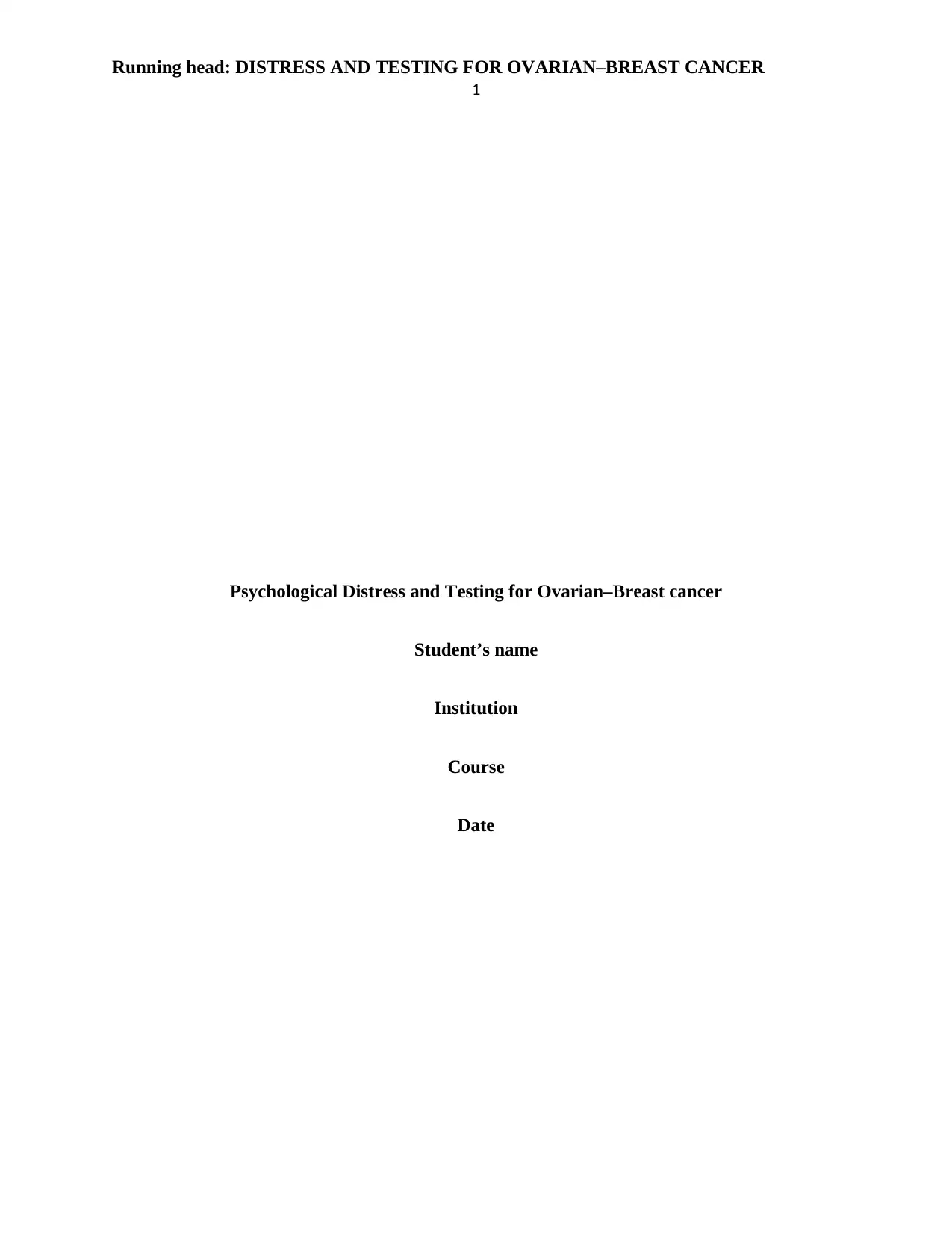
Running head: DISTRESS AND TESTING FOR OVARIAN–BREAST CANCER
1
Psychological Distress and Testing for Ovarian–Breast cancer
Student’s name
Institution
Course
Date
1
Psychological Distress and Testing for Ovarian–Breast cancer
Student’s name
Institution
Course
Date
Paraphrase This Document
Need a fresh take? Get an instant paraphrase of this document with our AI Paraphraser
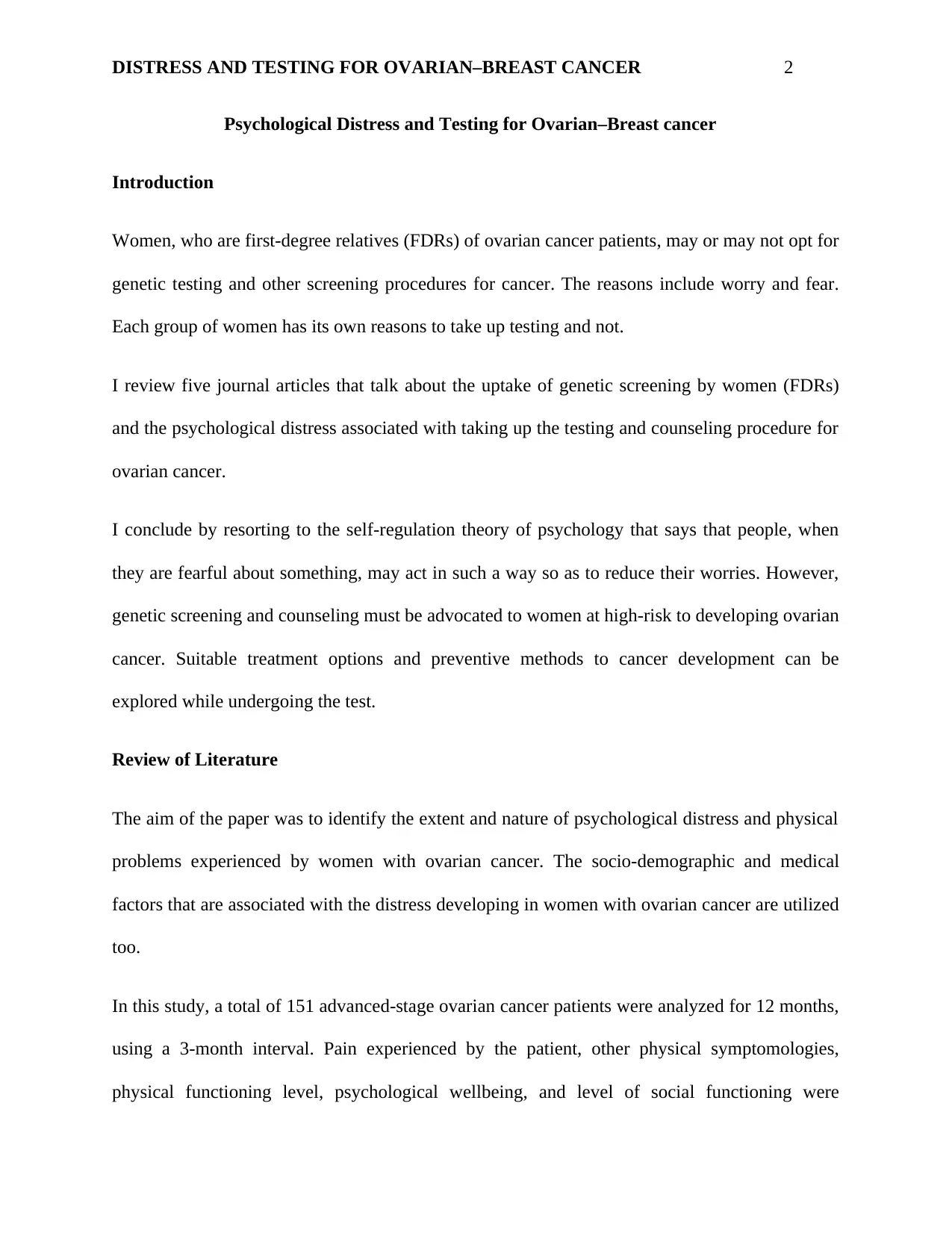
DISTRESS AND TESTING FOR OVARIAN–BREAST CANCER 2
Psychological Distress and Testing for Ovarian–Breast cancer
Introduction
Women, who are first-degree relatives (FDRs) of ovarian cancer patients, may or may not opt for
genetic testing and other screening procedures for cancer. The reasons include worry and fear.
Each group of women has its own reasons to take up testing and not.
I review five journal articles that talk about the uptake of genetic screening by women (FDRs)
and the psychological distress associated with taking up the testing and counseling procedure for
ovarian cancer.
I conclude by resorting to the self-regulation theory of psychology that says that people, when
they are fearful about something, may act in such a way so as to reduce their worries. However,
genetic screening and counseling must be advocated to women at high-risk to developing ovarian
cancer. Suitable treatment options and preventive methods to cancer development can be
explored while undergoing the test.
Review of Literature
The aim of the paper was to identify the extent and nature of psychological distress and physical
problems experienced by women with ovarian cancer. The socio-demographic and medical
factors that are associated with the distress developing in women with ovarian cancer are utilized
too.
In this study, a total of 151 advanced-stage ovarian cancer patients were analyzed for 12 months,
using a 3-month interval. Pain experienced by the patient, other physical symptomologies,
physical functioning level, psychological wellbeing, and level of social functioning were
Psychological Distress and Testing for Ovarian–Breast cancer
Introduction
Women, who are first-degree relatives (FDRs) of ovarian cancer patients, may or may not opt for
genetic testing and other screening procedures for cancer. The reasons include worry and fear.
Each group of women has its own reasons to take up testing and not.
I review five journal articles that talk about the uptake of genetic screening by women (FDRs)
and the psychological distress associated with taking up the testing and counseling procedure for
ovarian cancer.
I conclude by resorting to the self-regulation theory of psychology that says that people, when
they are fearful about something, may act in such a way so as to reduce their worries. However,
genetic screening and counseling must be advocated to women at high-risk to developing ovarian
cancer. Suitable treatment options and preventive methods to cancer development can be
explored while undergoing the test.
Review of Literature
The aim of the paper was to identify the extent and nature of psychological distress and physical
problems experienced by women with ovarian cancer. The socio-demographic and medical
factors that are associated with the distress developing in women with ovarian cancer are utilized
too.
In this study, a total of 151 advanced-stage ovarian cancer patients were analyzed for 12 months,
using a 3-month interval. Pain experienced by the patient, other physical symptomologies,
physical functioning level, psychological wellbeing, and level of social functioning were
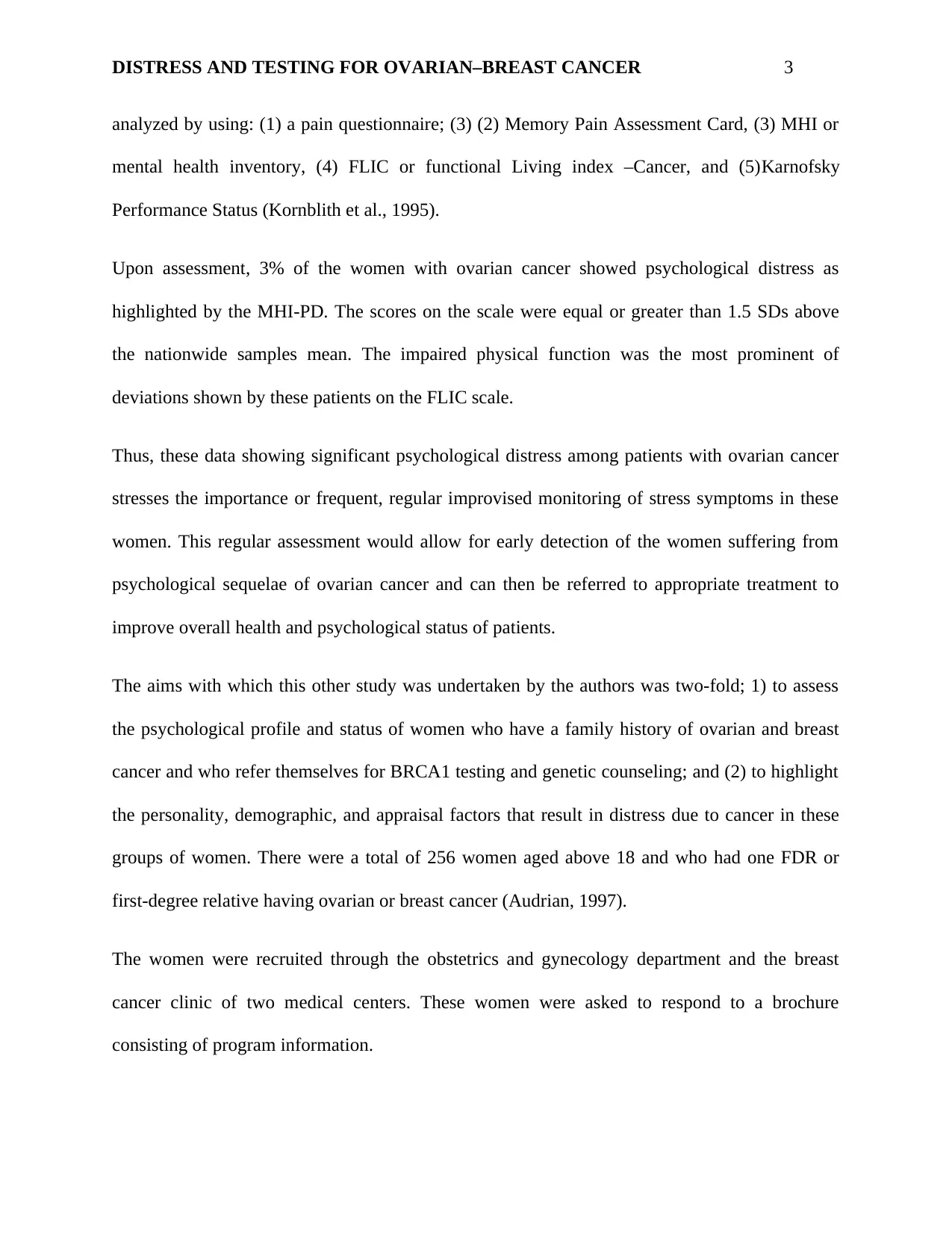
DISTRESS AND TESTING FOR OVARIAN–BREAST CANCER 3
analyzed by using: (1) a pain questionnaire; (3) (2) Memory Pain Assessment Card, (3) MHI or
mental health inventory, (4) FLIC or functional Living index –Cancer, and (5)Karnofsky
Performance Status (Kornblith et al., 1995).
Upon assessment, 3% of the women with ovarian cancer showed psychological distress as
highlighted by the MHI-PD. The scores on the scale were equal or greater than 1.5 SDs above
the nationwide samples mean. The impaired physical function was the most prominent of
deviations shown by these patients on the FLIC scale.
Thus, these data showing significant psychological distress among patients with ovarian cancer
stresses the importance or frequent, regular improvised monitoring of stress symptoms in these
women. This regular assessment would allow for early detection of the women suffering from
psychological sequelae of ovarian cancer and can then be referred to appropriate treatment to
improve overall health and psychological status of patients.
The aims with which this other study was undertaken by the authors was two-fold; 1) to assess
the psychological profile and status of women who have a family history of ovarian and breast
cancer and who refer themselves for BRCA1 testing and genetic counseling; and (2) to highlight
the personality, demographic, and appraisal factors that result in distress due to cancer in these
groups of women. There were a total of 256 women aged above 18 and who had one FDR or
first-degree relative having ovarian or breast cancer (Audrian, 1997).
The women were recruited through the obstetrics and gynecology department and the breast
cancer clinic of two medical centers. These women were asked to respond to a brochure
consisting of program information.
analyzed by using: (1) a pain questionnaire; (3) (2) Memory Pain Assessment Card, (3) MHI or
mental health inventory, (4) FLIC or functional Living index –Cancer, and (5)Karnofsky
Performance Status (Kornblith et al., 1995).
Upon assessment, 3% of the women with ovarian cancer showed psychological distress as
highlighted by the MHI-PD. The scores on the scale were equal or greater than 1.5 SDs above
the nationwide samples mean. The impaired physical function was the most prominent of
deviations shown by these patients on the FLIC scale.
Thus, these data showing significant psychological distress among patients with ovarian cancer
stresses the importance or frequent, regular improvised monitoring of stress symptoms in these
women. This regular assessment would allow for early detection of the women suffering from
psychological sequelae of ovarian cancer and can then be referred to appropriate treatment to
improve overall health and psychological status of patients.
The aims with which this other study was undertaken by the authors was two-fold; 1) to assess
the psychological profile and status of women who have a family history of ovarian and breast
cancer and who refer themselves for BRCA1 testing and genetic counseling; and (2) to highlight
the personality, demographic, and appraisal factors that result in distress due to cancer in these
groups of women. There were a total of 256 women aged above 18 and who had one FDR or
first-degree relative having ovarian or breast cancer (Audrian, 1997).
The women were recruited through the obstetrics and gynecology department and the breast
cancer clinic of two medical centers. These women were asked to respond to a brochure
consisting of program information.
⊘ This is a preview!⊘
Do you want full access?
Subscribe today to unlock all pages.

Trusted by 1+ million students worldwide
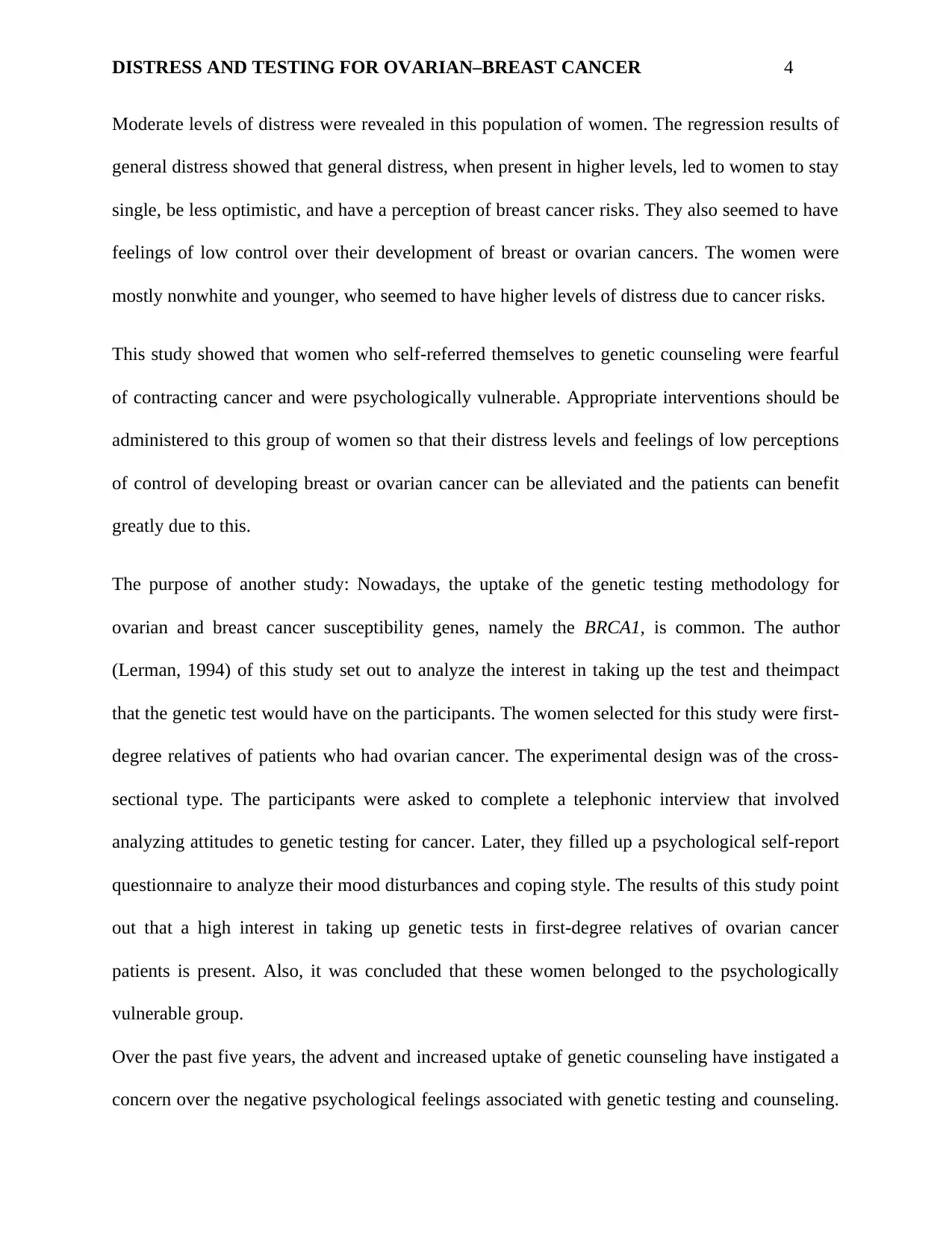
DISTRESS AND TESTING FOR OVARIAN–BREAST CANCER 4
Moderate levels of distress were revealed in this population of women. The regression results of
general distress showed that general distress, when present in higher levels, led to women to stay
single, be less optimistic, and have a perception of breast cancer risks. They also seemed to have
feelings of low control over their development of breast or ovarian cancers. The women were
mostly nonwhite and younger, who seemed to have higher levels of distress due to cancer risks.
This study showed that women who self-referred themselves to genetic counseling were fearful
of contracting cancer and were psychologically vulnerable. Appropriate interventions should be
administered to this group of women so that their distress levels and feelings of low perceptions
of control of developing breast or ovarian cancer can be alleviated and the patients can benefit
greatly due to this.
The purpose of another study: Nowadays, the uptake of the genetic testing methodology for
ovarian and breast cancer susceptibility genes, namely the BRCA1, is common. The author
(Lerman, 1994) of this study set out to analyze the interest in taking up the test and theimpact
that the genetic test would have on the participants. The women selected for this study were first-
degree relatives of patients who had ovarian cancer. The experimental design was of the cross-
sectional type. The participants were asked to complete a telephonic interview that involved
analyzing attitudes to genetic testing for cancer. Later, they filled up a psychological self-report
questionnaire to analyze their mood disturbances and coping style. The results of this study point
out that a high interest in taking up genetic tests in first-degree relatives of ovarian cancer
patients is present. Also, it was concluded that these women belonged to the psychologically
vulnerable group.
Over the past five years, the advent and increased uptake of genetic counseling have instigated a
concern over the negative psychological feelings associated with genetic testing and counseling.
Moderate levels of distress were revealed in this population of women. The regression results of
general distress showed that general distress, when present in higher levels, led to women to stay
single, be less optimistic, and have a perception of breast cancer risks. They also seemed to have
feelings of low control over their development of breast or ovarian cancers. The women were
mostly nonwhite and younger, who seemed to have higher levels of distress due to cancer risks.
This study showed that women who self-referred themselves to genetic counseling were fearful
of contracting cancer and were psychologically vulnerable. Appropriate interventions should be
administered to this group of women so that their distress levels and feelings of low perceptions
of control of developing breast or ovarian cancer can be alleviated and the patients can benefit
greatly due to this.
The purpose of another study: Nowadays, the uptake of the genetic testing methodology for
ovarian and breast cancer susceptibility genes, namely the BRCA1, is common. The author
(Lerman, 1994) of this study set out to analyze the interest in taking up the test and theimpact
that the genetic test would have on the participants. The women selected for this study were first-
degree relatives of patients who had ovarian cancer. The experimental design was of the cross-
sectional type. The participants were asked to complete a telephonic interview that involved
analyzing attitudes to genetic testing for cancer. Later, they filled up a psychological self-report
questionnaire to analyze their mood disturbances and coping style. The results of this study point
out that a high interest in taking up genetic tests in first-degree relatives of ovarian cancer
patients is present. Also, it was concluded that these women belonged to the psychologically
vulnerable group.
Over the past five years, the advent and increased uptake of genetic counseling have instigated a
concern over the negative psychological feelings associated with genetic testing and counseling.
Paraphrase This Document
Need a fresh take? Get an instant paraphrase of this document with our AI Paraphraser
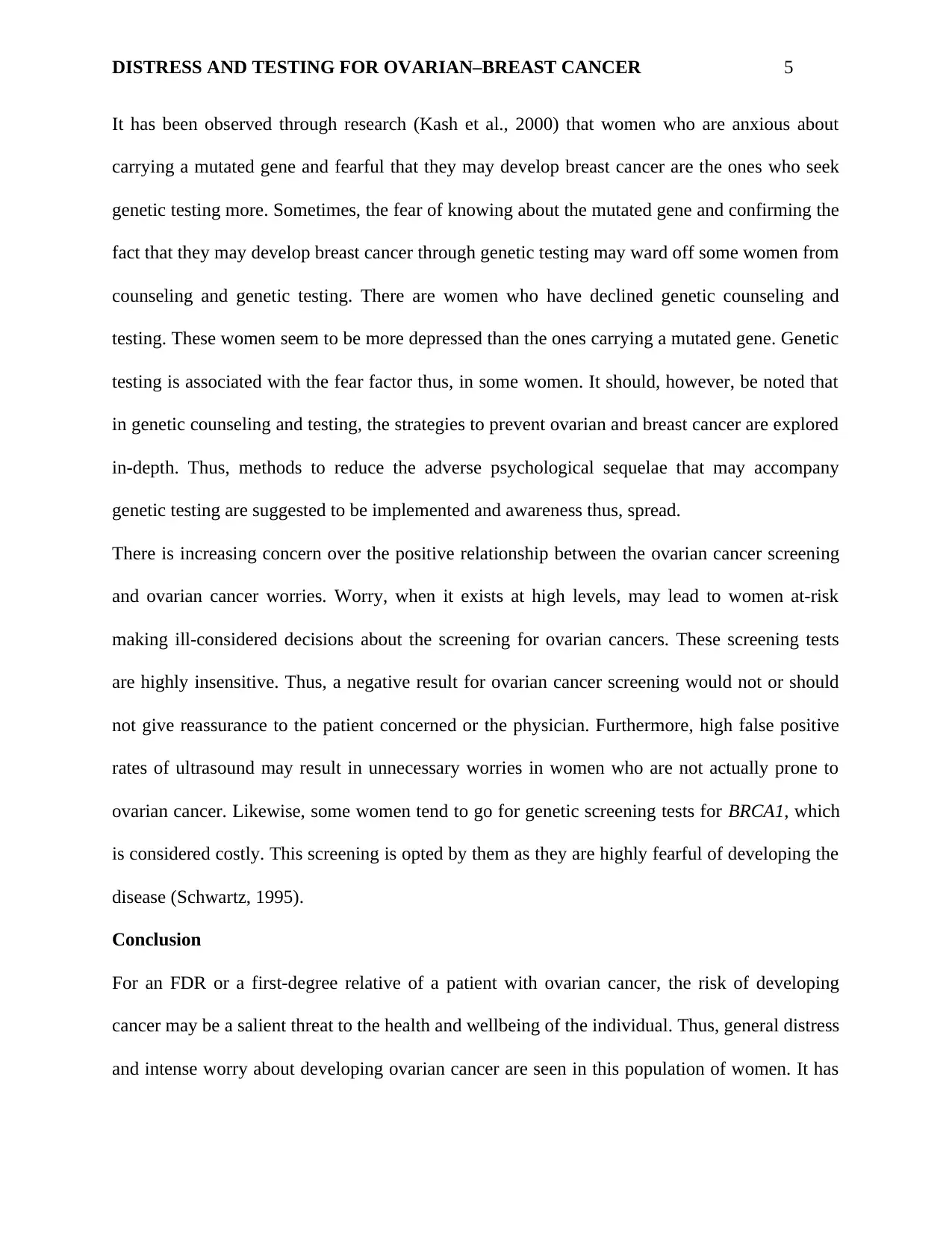
DISTRESS AND TESTING FOR OVARIAN–BREAST CANCER 5
It has been observed through research (Kash et al., 2000) that women who are anxious about
carrying a mutated gene and fearful that they may develop breast cancer are the ones who seek
genetic testing more. Sometimes, the fear of knowing about the mutated gene and confirming the
fact that they may develop breast cancer through genetic testing may ward off some women from
counseling and genetic testing. There are women who have declined genetic counseling and
testing. These women seem to be more depressed than the ones carrying a mutated gene. Genetic
testing is associated with the fear factor thus, in some women. It should, however, be noted that
in genetic counseling and testing, the strategies to prevent ovarian and breast cancer are explored
in-depth. Thus, methods to reduce the adverse psychological sequelae that may accompany
genetic testing are suggested to be implemented and awareness thus, spread.
There is increasing concern over the positive relationship between the ovarian cancer screening
and ovarian cancer worries. Worry, when it exists at high levels, may lead to women at-risk
making ill-considered decisions about the screening for ovarian cancers. These screening tests
are highly insensitive. Thus, a negative result for ovarian cancer screening would not or should
not give reassurance to the patient concerned or the physician. Furthermore, high false positive
rates of ultrasound may result in unnecessary worries in women who are not actually prone to
ovarian cancer. Likewise, some women tend to go for genetic screening tests for BRCA1, which
is considered costly. This screening is opted by them as they are highly fearful of developing the
disease (Schwartz, 1995).
Conclusion
For an FDR or a first-degree relative of a patient with ovarian cancer, the risk of developing
cancer may be a salient threat to the health and wellbeing of the individual. Thus, general distress
and intense worry about developing ovarian cancer are seen in this population of women. It has
It has been observed through research (Kash et al., 2000) that women who are anxious about
carrying a mutated gene and fearful that they may develop breast cancer are the ones who seek
genetic testing more. Sometimes, the fear of knowing about the mutated gene and confirming the
fact that they may develop breast cancer through genetic testing may ward off some women from
counseling and genetic testing. There are women who have declined genetic counseling and
testing. These women seem to be more depressed than the ones carrying a mutated gene. Genetic
testing is associated with the fear factor thus, in some women. It should, however, be noted that
in genetic counseling and testing, the strategies to prevent ovarian and breast cancer are explored
in-depth. Thus, methods to reduce the adverse psychological sequelae that may accompany
genetic testing are suggested to be implemented and awareness thus, spread.
There is increasing concern over the positive relationship between the ovarian cancer screening
and ovarian cancer worries. Worry, when it exists at high levels, may lead to women at-risk
making ill-considered decisions about the screening for ovarian cancers. These screening tests
are highly insensitive. Thus, a negative result for ovarian cancer screening would not or should
not give reassurance to the patient concerned or the physician. Furthermore, high false positive
rates of ultrasound may result in unnecessary worries in women who are not actually prone to
ovarian cancer. Likewise, some women tend to go for genetic screening tests for BRCA1, which
is considered costly. This screening is opted by them as they are highly fearful of developing the
disease (Schwartz, 1995).
Conclusion
For an FDR or a first-degree relative of a patient with ovarian cancer, the risk of developing
cancer may be a salient threat to the health and wellbeing of the individual. Thus, general distress
and intense worry about developing ovarian cancer are seen in this population of women. It has
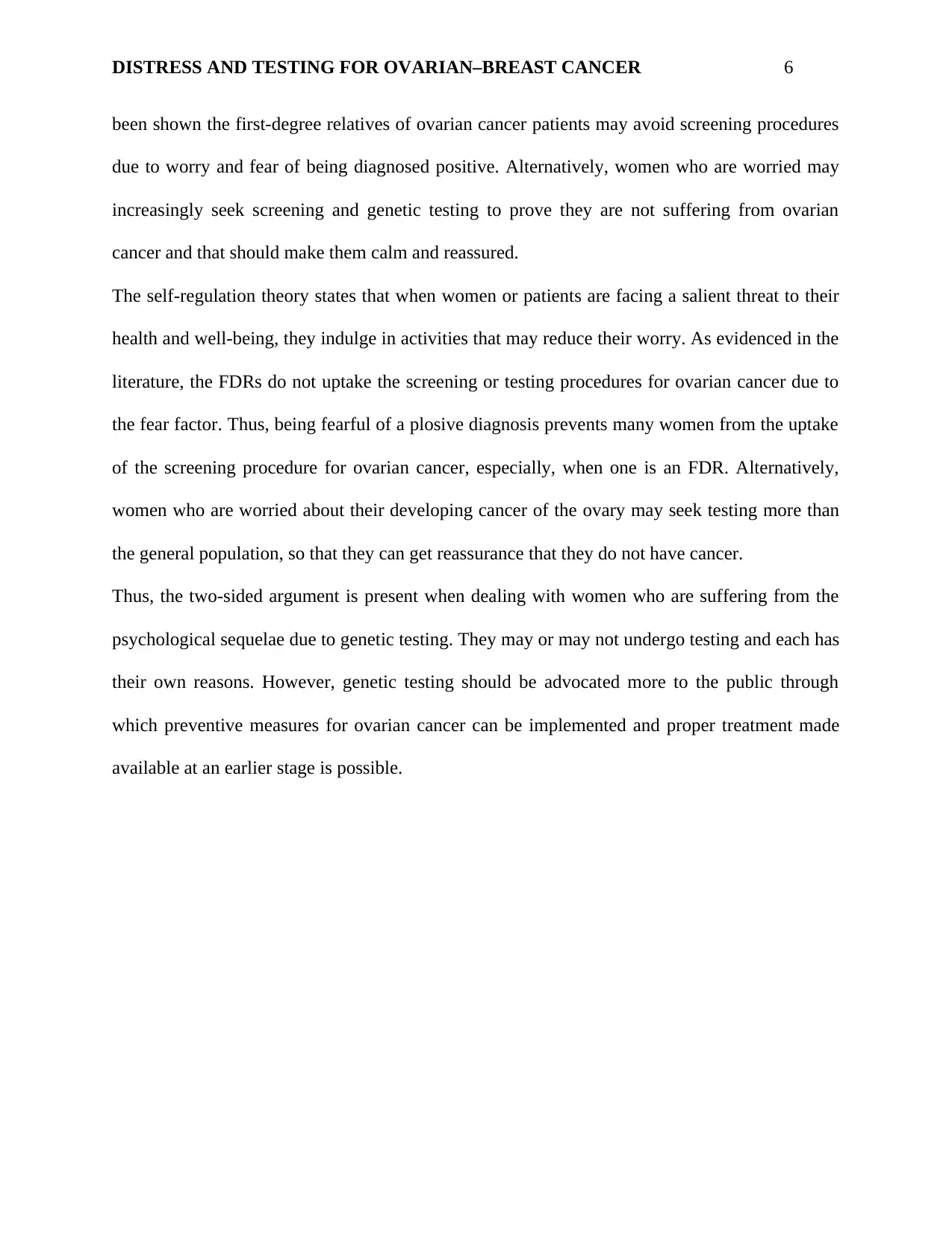
DISTRESS AND TESTING FOR OVARIAN–BREAST CANCER 6
been shown the first-degree relatives of ovarian cancer patients may avoid screening procedures
due to worry and fear of being diagnosed positive. Alternatively, women who are worried may
increasingly seek screening and genetic testing to prove they are not suffering from ovarian
cancer and that should make them calm and reassured.
The self-regulation theory states that when women or patients are facing a salient threat to their
health and well-being, they indulge in activities that may reduce their worry. As evidenced in the
literature, the FDRs do not uptake the screening or testing procedures for ovarian cancer due to
the fear factor. Thus, being fearful of a plosive diagnosis prevents many women from the uptake
of the screening procedure for ovarian cancer, especially, when one is an FDR. Alternatively,
women who are worried about their developing cancer of the ovary may seek testing more than
the general population, so that they can get reassurance that they do not have cancer.
Thus, the two-sided argument is present when dealing with women who are suffering from the
psychological sequelae due to genetic testing. They may or may not undergo testing and each has
their own reasons. However, genetic testing should be advocated more to the public through
which preventive measures for ovarian cancer can be implemented and proper treatment made
available at an earlier stage is possible.
been shown the first-degree relatives of ovarian cancer patients may avoid screening procedures
due to worry and fear of being diagnosed positive. Alternatively, women who are worried may
increasingly seek screening and genetic testing to prove they are not suffering from ovarian
cancer and that should make them calm and reassured.
The self-regulation theory states that when women or patients are facing a salient threat to their
health and well-being, they indulge in activities that may reduce their worry. As evidenced in the
literature, the FDRs do not uptake the screening or testing procedures for ovarian cancer due to
the fear factor. Thus, being fearful of a plosive diagnosis prevents many women from the uptake
of the screening procedure for ovarian cancer, especially, when one is an FDR. Alternatively,
women who are worried about their developing cancer of the ovary may seek testing more than
the general population, so that they can get reassurance that they do not have cancer.
Thus, the two-sided argument is present when dealing with women who are suffering from the
psychological sequelae due to genetic testing. They may or may not undergo testing and each has
their own reasons. However, genetic testing should be advocated more to the public through
which preventive measures for ovarian cancer can be implemented and proper treatment made
available at an earlier stage is possible.
⊘ This is a preview!⊘
Do you want full access?
Subscribe today to unlock all pages.

Trusted by 1+ million students worldwide
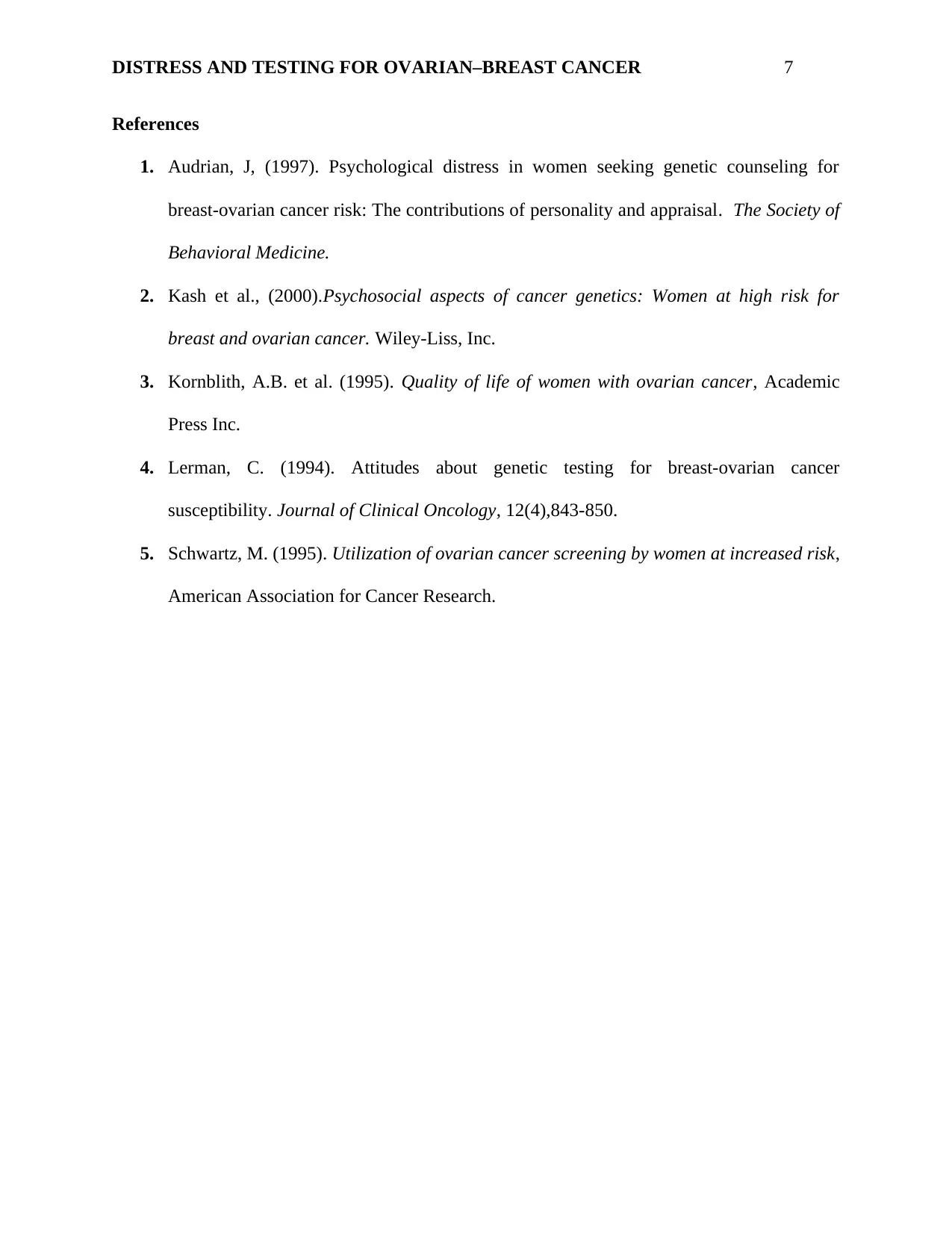
DISTRESS AND TESTING FOR OVARIAN–BREAST CANCER 7
References
1. Audrian, J, (1997). Psychological distress in women seeking genetic counseling for
breast-ovarian cancer risk: The contributions of personality and appraisal. The Society of
Behavioral Medicine.
2. Kash et al., (2000).Psychosocial aspects of cancer genetics: Women at high risk for
breast and ovarian cancer. Wiley-Liss, Inc.
3. Kornblith, A.B. et al. (1995). Quality of life of women with ovarian cancer, Academic
Press Inc.
4. Lerman, C. (1994). Attitudes about genetic testing for breast-ovarian cancer
susceptibility. Journal of Clinical Oncology, 12(4),843-850.
5. Schwartz, M. (1995). Utilization of ovarian cancer screening by women at increased risk,
American Association for Cancer Research.
References
1. Audrian, J, (1997). Psychological distress in women seeking genetic counseling for
breast-ovarian cancer risk: The contributions of personality and appraisal. The Society of
Behavioral Medicine.
2. Kash et al., (2000).Psychosocial aspects of cancer genetics: Women at high risk for
breast and ovarian cancer. Wiley-Liss, Inc.
3. Kornblith, A.B. et al. (1995). Quality of life of women with ovarian cancer, Academic
Press Inc.
4. Lerman, C. (1994). Attitudes about genetic testing for breast-ovarian cancer
susceptibility. Journal of Clinical Oncology, 12(4),843-850.
5. Schwartz, M. (1995). Utilization of ovarian cancer screening by women at increased risk,
American Association for Cancer Research.
1 out of 7
Your All-in-One AI-Powered Toolkit for Academic Success.
+13062052269
info@desklib.com
Available 24*7 on WhatsApp / Email
![[object Object]](/_next/static/media/star-bottom.7253800d.svg)
Unlock your academic potential
Copyright © 2020–2025 A2Z Services. All Rights Reserved. Developed and managed by ZUCOL.
